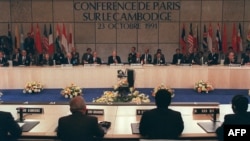Analysts and political experts have expressed concern over Cambodia’s democratic backslide that has resulted in the country falling short of commitments made in the 1991 Paris Peace Agreements.
The historic document that brought four warring factions to a peaceful resolution, including the now-ruling Cambodian People’s Party, contains within it requirements to observe and respect human rights and fundamental freedoms, specifically Article 15.
As Cambodians mark the 28th anniversary of the signing of the accords on October 23, observers said these principles have been left to the wayside by the current government.
Political commentator Lao Mong Hay said the average Cambodian was hurting from the unfulfilled promises of the Paris Peace Agreement, and were devoid of any legal and political recourse.
“Who do the people rely on now because when they turn to the authorities, the authorities turn to enforcing a crackdown. So, who can they rely on?” he said.
Lao Mong Hay added that the court system and political class worked hand-in-hand making it hard to express any dissent in the country.
The country’s court system has been plagued with endemic corruption according to an International Bar Association report from 2016, and is often subject to political interference.
The government has also embarked on a political crackdown that has shuttered independent media organizations, outlawed the opposition and its members, and targeted civil society organizations.
While the most recent crackdown began after the 2017 commune elections, where the Cambodia National Rescue Party did better than expected, it has escalated in recent months following Sam Rainsy’s announcement that he will end his exile and return to Cambodia on November 9.
Since then, more than 50 party supporters and former officials have been arrested for allegedly plotting a coup and at least 160 people were questioned by the authorities in April and May over a similar announcement.
Soeung Sen Karuna, senior investigator of rights group Adhoc, said that while a citizen’s right to free expression had been affected severely, it was the lack of political representation that made it hard to advocate for their rights, again in violation of the spirit of the peace accords.
In the 2018 national elections, the Cambodian People’s Party won all the parliamentary seats, leaving Cambodia with a one-party National Assembly and Senate. Additionally, all commune chief positions held by the CNRP were handed over the CPP following the former’s dissolution in 2017.
“For political support, we don’t have it because we have already seen that ruling party has used systematic judicial measures to prosecute [the opposition] and create an unequal political field,” said Soeung Sen Karuna.
There are 18 signatories to the Paris Peace Agreement. These countries are supposed to promote and encourage the implementation of human rights and fundamental freedoms in Cambodia, and “in particular to prevent the recurrence of human rights abuses.”
The recent crackdown has seen the U.S. impose sanctions only on senior members of the Cambodian government, though there is legislation in Congress to expand these sanctions. The European Union is currently investigating human rights abuses in the country, which could lead to revocation of the “Everything But Arms” trade scheme.
Am Sam Ath, deputy director of monitoring at local rights group Licadho, said it was important to diffuse the political situation with a multiparty resolution, just as the accords had helped end Cambodia’s civil strife.
“We should end the political tensions by seeking a resolution because we can see that the Paris Peace Agreement made way to end the war,” he said. “So, why can’t we get the same solution for the current, heated political climate?”
CPP Senator Sok Eysan said the government was committed to the ideals of the Paris Peace Agreement and pointed to the lack of war to support his claim.
“Nowadays, nobody is concerned by the possibility of chaos or running into trenches to hide from planes or bombs. The people live happily,” he said, adding that the defense of sovereignty and territory proved the CPP’s commitment to the peace accords.







